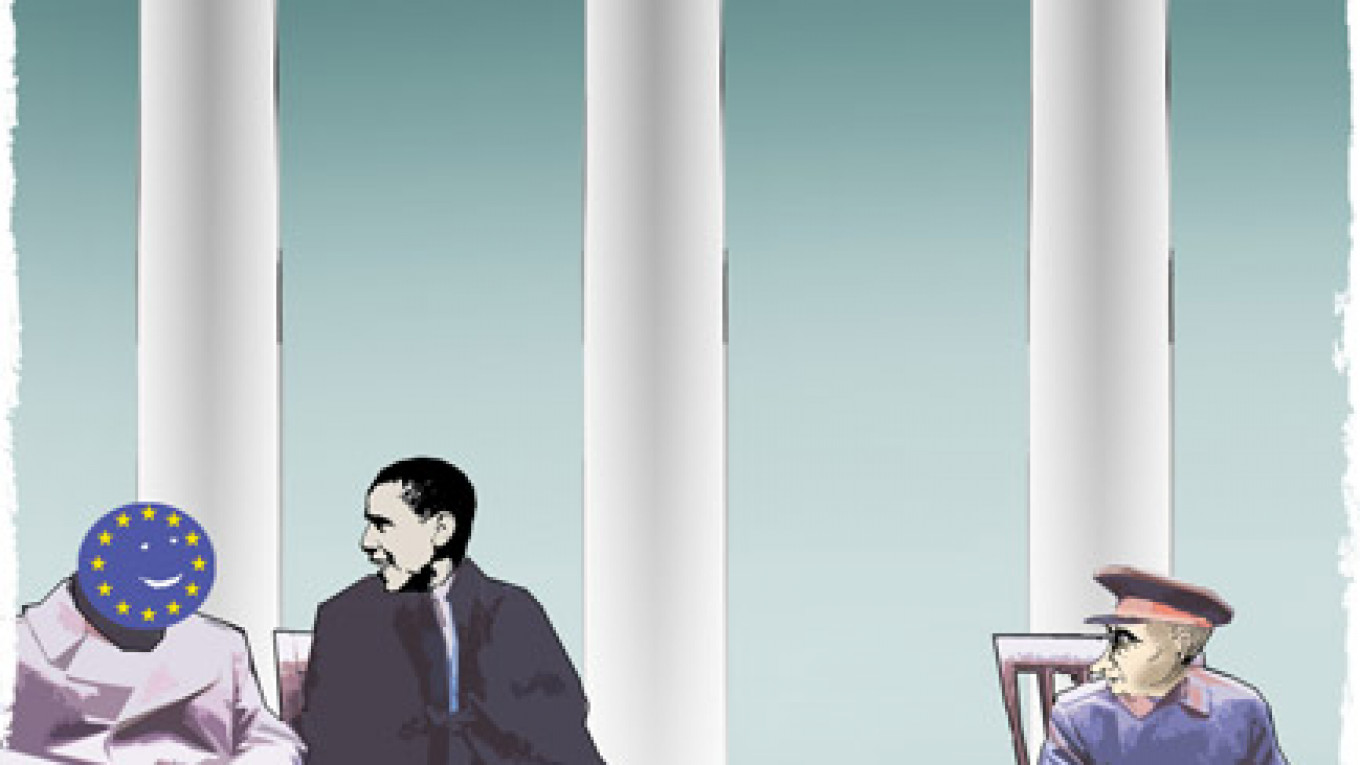Should U.S. President Barack Obama have agreed to formally meet with President Vladimir Putin today, during the 70th anniversary celebrations of the Allied landings in Normandy? Or is Obama right to not meet with him? And was it a good idea for French President Francois Hollande to break ranks with Obama and eat lunch with Putin in order to negotiate over the meal?
I tend to agree with those Western commentators who argue that Hollande's decision is controversial, but not clearly right or wrong. However, this situation once again illustrates the lack of unity between the U.S. and Europe over relations with Russia and suggests the existence of a schism in the West.
Of course, the U.S and Europe should have united on a policy towards Putin long ago, during his first term in office.
His war in Chechnya, his takeover of the independent NTV television station, and his back sliding on democratic procedures in domestic politics were early warning signs to Europe and the U.S. that there would be problems, including his seemingly innocuous but, in hindsight, very telling decision to reinstate the former "Stalinist" national anthem.
In those early days, however, the U.S. and Europe reasoned "Let us not alienate Russia because it will only unnecessarily anger and embitter the Kremlin. Let's engage with Russia instead." The West pursued that policy of "engagement" with Putin's Russia for many long years, despite the exasperation of its critics who cried that the policy of engagement was the same thing as appeasement.
New presidents and prime ministers came to power in the U.S. and Europe, but the policy of "engagement" remained the same. They believed it was best not to anger the Kremlin with unnecessary public criticism or overreact to anti-democratic and even outright authoritarian trends in Putin's domestic policies.
The main thing, they argued, was that Russia was a partner and even an ally in the international arena, helping the West with Iran and Afghanistan. They felt the West should work with Russia and involve Moscow in questions of mutual concern and that all of the "negative" issues would clear up by themselves.
Meanwhile, the West's behavior resembled that of a student who cannot bring themselves to study for an important test, half hoping and believing it would somehow magically go away.
However, the prerequisites needed to make those authoritarian trends suddenly vanish were never in place, and could never have gained a foothold.
That could only have happened if Russia had strengthened its democratic and market institutions, developed a competitive economic and political environment, encouraged small and medium-sized businesses, supported nongovernmental institutions, strengthened an independent judiciary, protected the independence of the media, built a transparent and fair electoral system, eliminated corruption and reduced the size and influence of the government bureaucracy.
But with everything — absolutely everything — the exact opposite happened.
Of course, every country's foreign policy eventually and inexorably comes to resemble its domestic policy. In fact, it was inevitable that Putin would one day make a sharp break with the West.
It finally happened this spring when he turned his back on the U.S., EU, United Nations, Organization for Security and Cooperation in Europe, NATO and others by swiping all these long-standing figures off of the international chess board and rejecting all the rules that ensure nothing less than the security of the entire world.
Some might argue that a bad peace is better than a good war, that negotiations are better than the complete absence of dialogue. Former U.S. presidents Franklin Delano Roosevelt and Harry Truman sat at the same negotiating table with former Soviet leader Josef Stalin, one of the worst dictators known to history.
Former U.S. presidents Dwight D. Eisenhower and John F. Kennedy met with former Soviet leader Nikita Khrushchev who, although a big improvement over Stalin, did manage to almost start World War III by attempting to station Soviet nuclear missiles in Cuba.
And, if Washington and Moscow had refused to negotiate at that juncture, a World War might have ensued. Former U.S. Presidents Richard Nixon, Gerald Ford and Jimmy Carter successfully negotiated with former Soviet leader Leonid Brezhnev — known for overseeing this country's period of "stagnation" — and even signed the first agreements limiting strategic arms and missile defense systems. Carter and Brezhnev even hugged and kissed when they signed the SALT-2 treaty in Vienna.
Former U.S. President Ronald Reagan sat at the negotiating table with former Soviet leader Mikhail Gorbachev at a time when Soviet SS-20 missiles were aimed at Europe and Pershing missiles based in Europe were pointed at the Soviet Union, when nobody seriously believed that Washington could reach any sort of agreement with Moscow, much less that the Cold War would come to an end.
However, I believe these examples do not apply to the current situation. I am convinced that the U.S. and Soviet leaders negotiated with each other because they sincerely did not want another world war.
Despite all the differences in ideology and values that the leaders of the East and West professed, the generation of politicians who had fought in or lived through World War II carried that experience in their hearts and souls for the rest of their lives. It spawned the firm conviction that such a thing should never happen again.
But what occupies the thoughts of their modern-day successors? Only this: "How can we pretend we are not betraying Ukraine but also maintain our supply of Russian gas and hold onto the Russian money invested in London real estate?"
The current generation of politicians on both sides of the invisible line where the Iron Curtain once stood have only seen World War II in the movies. They have become nothing more than lackluster business managers who are far removed from the elevated ideological pathos of such political crusaders of the recent past as Ronald Reagan and former British Prime Minister Margaret Thatcher.
Whatever their shortcomings, they staunchly believed in the fundamental values of freedom and democracy. They would never have invited Putin to Normandy, much less have met with him there. Unfortunately, those leaders are no longer with us. But I am certain that new Reagans and Thatchers will arise out of the needs of the new era the world entered in 2014.
An earlier version of this article incorrectly stated that former U.S. President Theodore Roosevelt sat at the negotiating table with former Soviet leader Joseph Stalin, when in fact it was President Franklin Delano Roosevelt.
Yevgeny Kiselyov is a political analyst and television journalist.
A Message from The Moscow Times:
Dear readers,
We are facing unprecedented challenges. Russia's Prosecutor General's Office has designated The Moscow Times as an "undesirable" organization, criminalizing our work and putting our staff at risk of prosecution. This follows our earlier unjust labeling as a "foreign agent."
These actions are direct attempts to silence independent journalism in Russia. The authorities claim our work "discredits the decisions of the Russian leadership." We see things differently: we strive to provide accurate, unbiased reporting on Russia.
We, the journalists of The Moscow Times, refuse to be silenced. But to continue our work, we need your help.
Your support, no matter how small, makes a world of difference. If you can, please support us monthly starting from just $2. It's quick to set up, and every contribution makes a significant impact.
By supporting The Moscow Times, you're defending open, independent journalism in the face of repression. Thank you for standing with us.
Remind me later.







